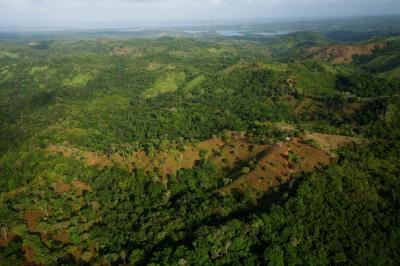Reducing deforestation in the tropics would significantly cut the amount of carbon dioxide emitted into the atmosphere – by as much as one-fifth – research shows.
In the first study of its kind, scientists have calculated the amount of carbon absorbed by the world’s tropical forests and the amounts of greenhouse gas emissions created by loss of trees, as a result of human activity.
They found that tropical forests absorb almost two billion tonnes of carbon each year, equivalent to one-fifth of the world’s carbon emissions, by storing it in their bark, leaves and soil. However, an equivalent amount is lost through logging, clearing of land for grazing, and growing biofuel crops such as palm oil, soya bean and sugar. Peat fires in forests add significantly to the greenhouse gas emissions.
Researchers estimate that if all human-related deforestation of the tropics were to stop, the forests could absorb more carbon than at present, equivalent to one-fifth of global emissions.
Researchers say carbon emissions from tropical forests will increase as the climate warms, as rising temperatures accelerate the decay of dead plants and trees, giving off more CO2. Global temperatures are forecast to rise by two degrees by the year 2099, which is predicted to increase annual carbon emissions from the forest by three-quarters of a billion tonnes.
Scientists from the Universities of Edinburgh and Leeds analysed data from multiple previous studies, including satellite studies, to determine the amount of carbon absorbed and emitted by the world’s tropical forests in South and Central America, equatorial Africa and Asia.
Their study, published in Global Change Biology, was supported by the Natural Environment Research Council.
Professor John Grace of the University of Edinburgh’s School of GeoSciences, who led the study, said: “If we limit human activity in the tropical forests of the world, this could play a valuable role in helping to curb the rise in carbon dioxide in the atmosphere. Preventing further losses of carbon from our tropical forests must remain a high priority.”



There is certainly abundant evidence of the devastation that occurs when forests are cut, such as in Africa, where clear cut forest areas rapidly turn into desert. This is a death knell for indigenous tribes who have lived in the forests for centuries with all of their needs supplied by the native forests.
Deserts do not meet such needs.
A great reference on this topic is by Pulitzer Prize winner and MacArthur Fellow Jared Diamond of UCLA, named by Time Magazine as one of the 25 most influential Americans.
His classic “Collapse- How Societies Chose to Fail or Succeed” studies some six different societies throughout history that had either failed or thrived.
Deforestation was the root cause of the failure of several societies Diamond cited.
On the other hand, Japan thrived as a civilization primarily because its Emperor decreed that cutting even one tree would result in the death sentence.
Over a decade ago, ABC News anchor Ted Koppel did a compelling documentary about the subsistence life of an unwed and illiterate mother of ten in Africa. Much of her time was spent foraging for wood to heat the meager meals that she slaved to put on the table for her large family.
If you ever want a heart rending and compelling video argument about the incredible human costs of deforestation, this will bring tears to your audience.